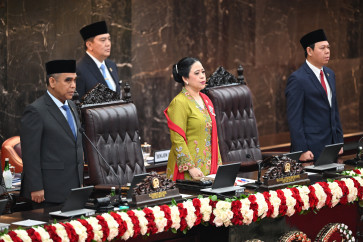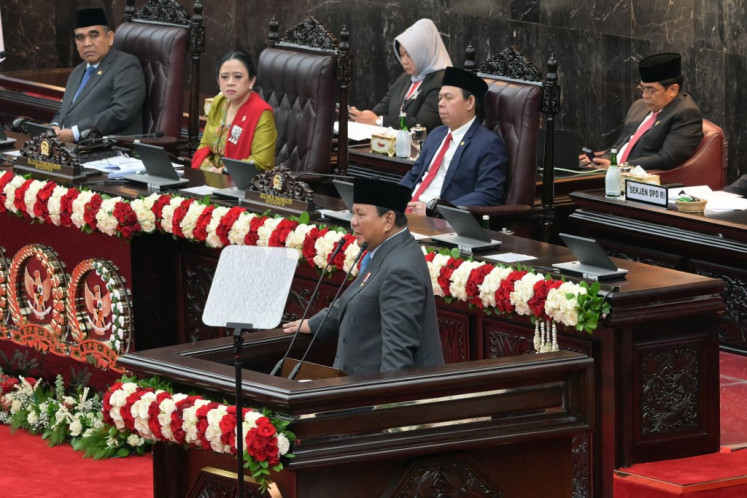Popular Reads
Top Results
Can't find what you're looking for?
View all search resultsPopular Reads
Top Results
Can't find what you're looking for?
View all search resultsChildcare, work conflicts threaten women’s economic productivity
Change text size
Gift Premium Articles
to Anyone
I
ndonesia’s demographics show the potential for women in economic development but it is feared work and childcare conflicts will derail their productivity.
The 2020 population statistics reveal that of the total of 269.6 million people in Indonesia, women account for 134.27 million, 53.6 percent of whom are said to be at a productive age.
“Such great potential, even if we could steer just half the productive number into economic activities, would certainly increase regional or national revenues, and most importantly household wellbeing,’ Agustina Erni, deputy head of gender equality at the Women’s Empowerment and Child Protection Ministry, said during a recent live webinar.
The online talk show, which was co-organized by the Center for International Policy Studies (CIPS) and Forum Kajian Pembangunan (Development Analysis Forum), raised the theme of Child Daycare: A Pathway to Supporting Women to Work, and presented as keynote speakers were Diahhadi Setyonaluri of the Indonesia University Demography Institute, World Bank representative Daniel Halim and Nizma Fadila of the Indonesia Business Coalition for Women’s Empowerment (IBCWE).
Women may have excelled in education, but lingering social situations are perceived as interfering in their careers.
“I am by no means suggesting that all women must work because some may feel settled with their household roles,” Agustina said.
She said laws were already in place to give protection to women in regard to the right to work but unsupportive employers’ policies and household conditions were impeding the implementation.
“The government has also ratified the ILO [International Labor Organization], which aims to abolish all forms of discrimination at work,” she said.
Statistics Indonesia data show women’s labor participation is 30 percent lower than men, 51.89 percent to 83.13 percent. Neighboring countries such as Malaysia, Singapore and Thailand have higher rates for women’s participation in the labor force, at 65.67 percent, 78.79 percent and 78.27 percent respectively.
“The government is looking to increase women’s labor participation to 55 percent in 2024. We also have a target to improve the Gender Empowerment Index, which is still at 30.6 percent,” she said.
“We ask all stakeholders to pool their resources to work collectively on the issue because it is not an easy task to get more women into economic activities. One of the barriers is the issue of child daycare,” she said.
Burden of care
Diahhadi identified key determinants of women’s labor force participation in Indonesia, which include traditional norms on household roles, education and employment characteristics.
“Shifts in marital status and childbearing are strongly associated with a woman’s decision to quit work,” she said, adding that the probabilities of exiting work vary depending on educational level and work conditions.
“Women with high school educations pose a higher probability for employment exit when they are married and have a child than those with higher educations. Employment characteristics regarding work conditions, job security, work contracts and gender discrimination can trigger employment exit,” she said.
She said the solution to the problems would be to reduce the burden of childcare not only for women but also working parents.
“We must keep promoting equal responsibilities among parents about childcare. We also encourage employers to provide an option for flexible working hours,” she said.
The provision of access to affordable, comfortable and reliable daycare is seen as crucial to reducing conflicts between work and childcare.
“Some women can keep working because they can share the childcare burden either with relatives or daycare and some others decide to quit work citing the burden of care arising from traditional household norms while having a lack of childcare access,” she said.
The coronavirus pandemic has had a huge physical and mental impact on parents who worry about the domestic burden.
Nizma emphasized the urgency for all stakeholders, companies in particular, to address what she described as equity and the business merit companies might gain in return.
“Corporations need to heed childcare issues in order to reduce the burden on female employees,” she said.
The business merit of employers supporting childcare, she said, would be found in employee recruitment and retention, productivity, creativity, employee compliance, work relations and brand reputation.
Daycare centers
The CIPS reports that it is currently conducting market research regarding childcare providers, users, non-users, as well as gender-based policies with a view to helping encourage more women into the labor force, the results of which are expected by the end of this year.
“While the outlined problem lies in social norms that domestic work including childcare are the women’s domain, the availability of daycare facilities will be of much help,” CIPS researcher Nadia Fairuza Azzahra said.
She urged childcare service providers to heed the factors of trust, affordability and care facilities.
The ministry regulation No. 5/2015 stipulates daycare provisions.
“This provides guidance for governmental and private institutions in providing gender-responsive workplaces. We have been promoting it to ministry offices and regional offices,” Agustina said.
She added that the government might see the urgency of requiring developers to include the provision of a childcare center in their development plans for new residential areas.










